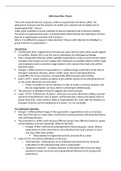Other
Org. Behaviour & Analysis- Power Lecture Notes, Reading List Book Summaries and Essay Plans
- Course
- Institution
Detailed notes, including lecture notes, reading list book summaries and essay plans for the Oxford University FHS Organisational Behaviour & Analysis course's section on Power (Week 4 of the course).
[Show more]



